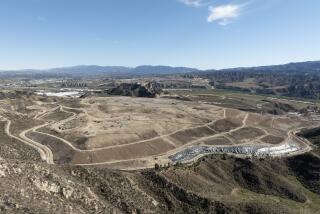Homeowners Settle Dump Suit With Developer : Environment: Firm will pay $12 million to residents of a Paradise Hills project to replace a faulty gas-control system.
- Share via
A group of Paradise Hills homeowners who sued their project’s developer over the management of a nearby abandoned dump received a $12-million settlement Thursday.
Treetops Unlimited, the developer of the 680-home Hillsborough project, agreed to pay $11.6 million to the homeowners association to replace the gas-control system at the landfill that was intended to burn off methane gases produced by decomposing trash.
Homeowners will also receive $500 each under the settlement, which was approved in Superior Court on June 20.
On Wednesday, homeowners filed another lawsuit, this time in federal court, against San Diego County for the continued cost of maintaining the 34-acre dump, which was run by the county for 12 years.
Responsibility for the management of the landfill, and 30% of its ownership, was transferred to the Hillsborough Master Assn. when the houses were sold in 1984, a fact that homeowners said Treetops kept secret from them when they bought their homes.
The San Diego Unified School District owned the remaining 70% of the landfill, but had no plans to build a school on the site. Now Hillsborough owns 100% of the landfill.
“When we bought our houses, the only thing we were told was that it was a school site and that it was an abandoned landfill,” said Anne Krueger, president of the homeowners association. “There was never any mention that it was the homeowners’ responsibility to maintain the landfill.”
Krueger said they did not realize they were responsible for the site until 1987, when the county cited the group for not maintaining the gas-control system, which leaked methane. The just-settled lawsuit against Treetops was filed a year later.
Treetops, however, maintains that ownership of the landfill was a matter of public record when they sold the houses and that buyers had been informed of that condition, said Jeffrey Shohet, an attorney for the developers.
Treetops conceded, however, that it is partly responsible for fixing the gas-control system, Shohet said.
“Even though we had put in what we thought was a state-of-the art (system), it failed, and we were responsible to the homeowners for that,” he said.
Both sides agree that there appear to be no health problems linked to the system’s deterioration or from water contaminated by waste at the landfill.
The cost of a new gas-control system is estimated at $68 million, and the homeowners’ suit against the county seeks to recover $56 million, the difference between the total estimated cost of the replacement and the amount Treetops has agreed to pay, said Gary Aguirre, an attorney representing the homeowners.
The county operated the Old Sweetwater Landfill from its inception in 1948 to its close in 1960 and supervised the installation of the gas-control system in the mid-1980s.
In 1985, the county Air Pollution Control District inspected and approved the system, but turned around and cited the homeowners two years later for gas emissions and equipment violations stemming from it, the homeowners said.
“We feel that it is the county’s trash and it is their responsibility, and we hope that they take that responsibility,” Krueger said. “I’m angry at the county for ducking that responsibility.”
Allison Swaney, deputy county counsel, declined to comment on the case, saying it is the county’s policy not to comment on pending litigation.
The homeowners are also suing six other parties for their roles in installing the system, including First American Title Insurance Co., which sold insurance policies to the homeowners and, according to the homeowners, also failed to alert them that they would be given the responsibility of maintaining the landfill.
The litigation over the landfill has already produced more pleadings and filings than any action ever filed in a branch of San Diego County Superior Court, Aguirre said.
“This is one of the more complex cases we have handled. The whole area of environmental law and its applications to a situation like this involves some very novel issues of the court that took a lot more time than usual,” Aguirre said.
The case included 249 depositions, 1,738 separate court pleadings and more than 130 expert witnesses testifying on landfill technology.
More to Read
Sign up for Essential California
The most important California stories and recommendations in your inbox every morning.
You may occasionally receive promotional content from the Los Angeles Times.










